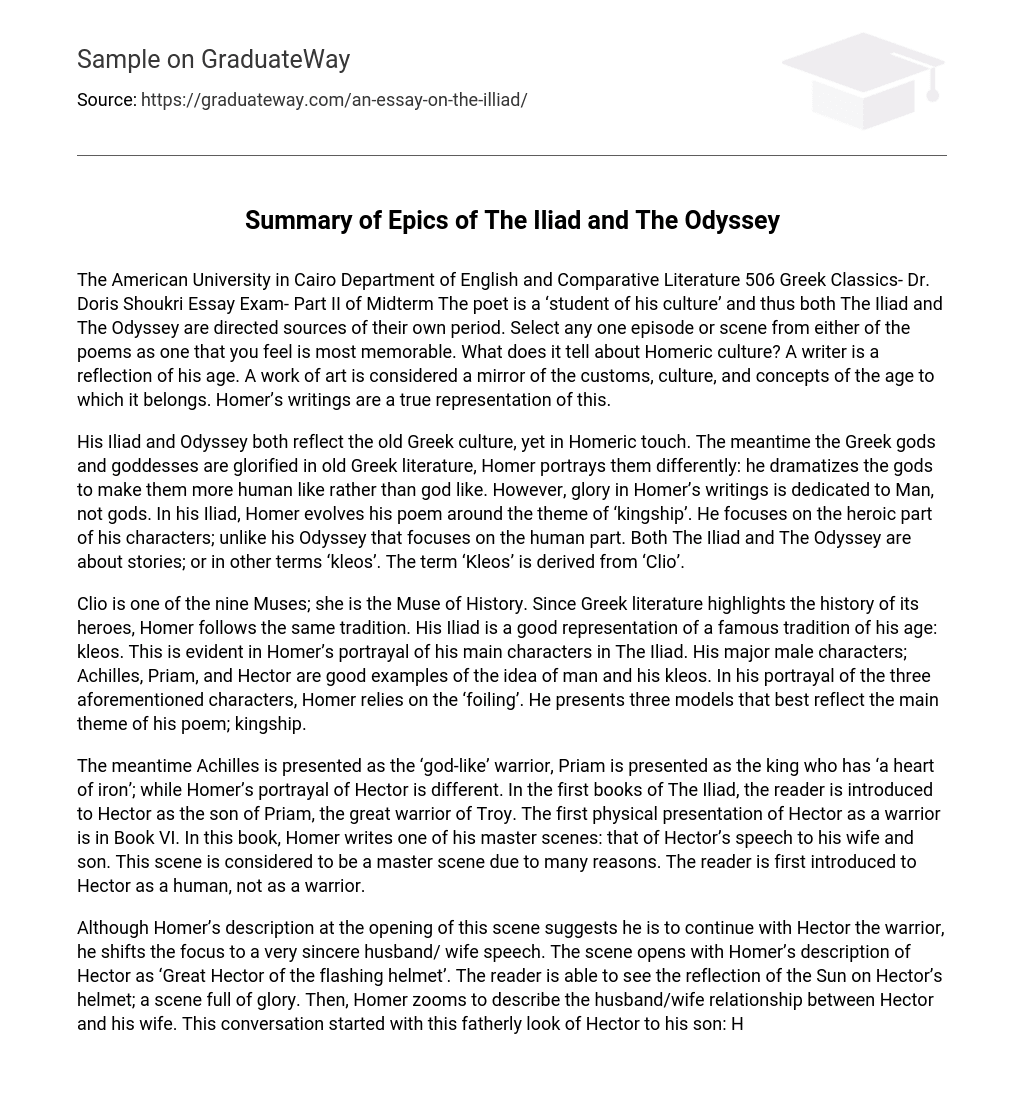The American University in Cairo Department of English and Comparative Literature 506 Greek Classics- Dr. Doris Shoukri Essay Exam- Part II of Midterm The poet is a ‘student of his culture’ and thus both The Iliad and The Odyssey are directed sources of their own period. Select any one episode or scene from either of the poems as one that you feel is most memorable. What does it tell about Homeric culture? A writer is a reflection of his age. A work of art is considered a mirror of the customs, culture, and concepts of the age to which it belongs. Homer’s writings are a true representation of this.
Both The Iliad and The Odyssey by Homer portray the ancient Greek culture in a unique way. In traditional Greek literature, the gods and goddesses are highly respected, but Homer presents them with human-like attributes instead of as divine beings. However, Homer’s writings exalt humanity rather than the gods. In The Iliad, Homer centralizes his poem on the concept of ‘kingship’ and highlights the heroic qualities of his characters. Conversely, The Odyssey focuses on human experiences. Both poems revolve around stories or ‘kleos’, a term derived from ‘Clio’.
Clio, one of the nine Muses, is the Muse of History. In Greek literature, the history of heroes is emphasized, and Homer follows this tradition. In his Iliad, Homer represents the famous tradition of his time known as kleos. This tradition is reflected in Homer’s portrayal of the main characters in The Iliad, particularly Achilles, Priam, and Hector. These three characters exemplify the concept of man and his kleos. Homer employs the technique of ‘foiling’ to showcase these characters and their roles as kings in his poem.
Overall, the text highlights the contrasting portrayals of Achilles, Priam, and Hector in Homer’s epic poem The Iliad. While Achilles is depicted as a divine warrior and Priam as a king with a heart of iron, Hector’s introduction differs. Initially presented as Priam’s son and a formidable warrior in The Iliad’s earlier books, Hector’s first physical appearance as a warrior occurs in Book VI. In this book, Homer presents a remarkable scene in which Hector delivers a speech to his wife and son. This scene is considered a masterpiece for several reasons, including the fact that it introduces Hector as a human rather than solely as a warrior.
Despite initially suggesting that Homer will continue describing Hector as a warrior, he abruptly shifts the focus to a heartfelt exchange between a husband and wife. The scene begins with Homer vividly portraying Hector as “Great Hector of the flashing helmet,” allowing the reader to envision the radiance of the sun reflecting off his helmet, portraying a scene filled with grandeur. Then, Homer zooms in to emphasize the deep bond between Hector and his wife. This intimate conversation begins with Hector casting a fatherly gaze upon his son, leaving a smile on his face but without words escaping his lips.
Andromache, full of sorrow, approached him and grasped his hand, uttering: ‘Hector, you are possessed! This resolute decision of yours will lead to your demise. You show no concern for your young son or unfortunate wife… so Hector, you are both a father and mother and brother to me, as well as my stalwart husband… Andromache was striving to dissuade Hector from joining the war and engaging in combat since this implies his impending death, her facing widowhood, their son possibly becoming an orphan, and the risk of being captured by adversaries. Hector’s response to his spouse perfectly encapsulates the customs of that era.
Hector is committed to his wife and son, but he also has a responsibility to his people and to preserving history. As the renowned warrior with his shining helmet, he reminds Andromache of his reputation by saying: “Andromache, I constantly have all this in my mind too. However, if I were to hide like a coward and avoid battle, I would feel nothing but shame before our Trojans and their elegant Trojan women. Moreover, my heart would not be in it either. I have trained myself to always be a valiant warrior, to stand at the forefront and strive to bring glory to my father and myself.”
In this passage, Homer depicts Homer as a warrior who faces both glory and fear. While Hector is confident in his abilities as a warrior, he also harbors a fear of losing his family, people, and homeland of Troy. By humanizing the Greek hero, Homer presents him as not just a warrior, but also as a husband and father who has obligations towards his loved ones and his community. These obligations include being brave, protecting his land, standing on the front lines, and accepting his ultimate fate. Hector desires to be remembered as a hero who sacrificed his life in battle to defend his people and land, creating a kleos that will endure throughout history and be immortalized in recitation.





